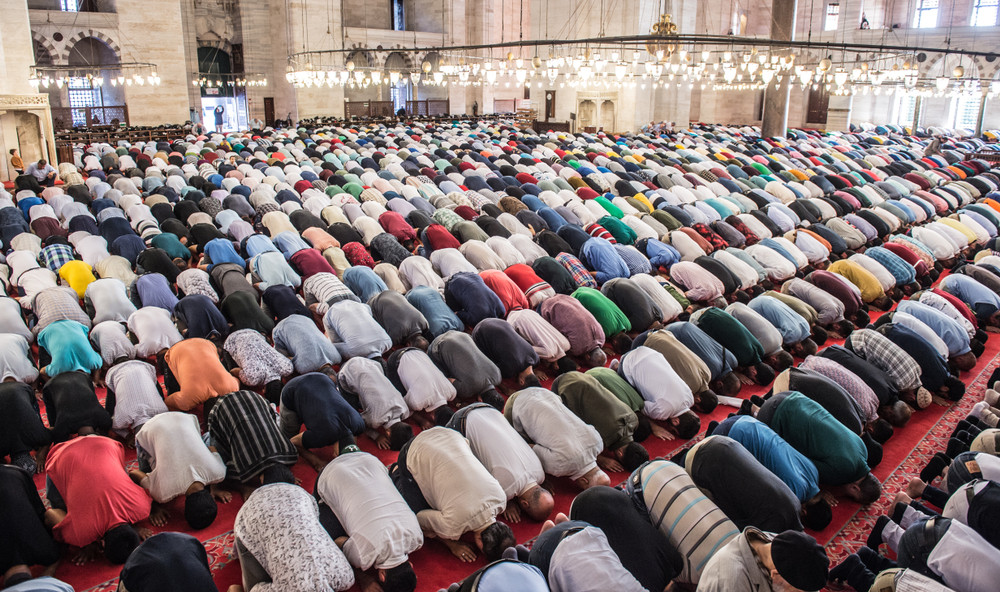In the name of Allah, may He be praised, and may His peace and blessings be upon His Messenger, Muhammad, his family, and his companions.
There are always questions whenever Eid occurs on a Friday, and I would like to clarify whether it is obligatory to pray both Eid Salah in the morning and Jumu’ah in the afternoon.
First of all, we should remember that both occasions are among the most important Islamic symbols. Attending both prayers and congregations are very virtuous. The mindset of the person should be to be eager to attend both prayers, as this is part of glorifying the symbols of Allah.
Allah says,
وَمَن يُعَظِّمْ شَعَـٰٓئِرَ ٱللَّهِ فَإِنَّهَا مِن تَقْوَى ٱلْقُلُوبِ
“And whoever honours the symbols of Allah – indeed, it is from the piety of hearts.” [1]
That is why most of the scholars including Hanafis and Mālikis consider attending both of them as obligatory.
The Shāfi’i school of thought gave an excuse only for those who live away from the city where the Jumu’ah is established, not to attend the Jumu’ah once they have attended the Eid Salah. The reason is due to the difficulty they are likely to encounter in coming back to attend the Jumu’ah Salah.
These scholars say that attending Jumu’ah is wājib by consensus, as Allah says,
يَـٰٓأَيُّهَا ٱلَّذِينَ ءَامَنُوٓا۟ إِذَا نُودِىَ لِلصَّلَوٰةِ مِن يَوْمِ ٱلْجُمُعَةِ فَٱسْعَوْا۟ إِلَىٰ ذِكْرِ ٱللَّهِ وَذَرُوا۟ ٱلْبَيْعَ ۚ ذَٰلِكُمْ خَيْرٌۭ لَّكُمْ إِن كُنتُمْ تَعْلَمُونَ
“O you who have believed, when [the adhan] is called for the prayer on the day of Jumu’ah [Friday], then proceed to the remembrance of Allah and leave trade. That is better for you, if you only knew.” [2]
The scholars have said that lifting this confirmed obligation needs further evidence of the same level and most of the evidences that are presented are not strong enough to waiver this obligation.
Furthermore, al-Nu’mān ibn Bashīr narrated that,
“The Messenger of Allah (ﷺ) used to recite: ‘Glorify the Name of your Lord, the Most High’ and ‘Has there come to you the narration of The Overwhelming?’, on Friday and on Eid, and when Friday and Eid converged, he would recite them both.”[3]
This incident also happened during the time of ‘Uthmān ibn Affān, as it is reported in the Sahīh of al-Bukhārī (raḥimahu Allah) and the Muwatta’ of Mālik (raḥimahu Allah) that Abu ‘Ubayd, the freed slave of Ibn Azhar, said,
“I was present on the occasion of two Eids (together) with ‘Uthmān ibn Affān; that was on a Friday. He offered the (Eid) prayer before the khutbah, then delivered the khutbah and said,
‘O people, on this day two Eids have come to you together, so whoever wants to wait for Jumu‘ah with the people of al-‘Awali, let him do so, and whoever wants to go back, then I gave him permission to do so.'”
However, the official opinion of the Hanbali school of thought is that attending one of the two prayers is sufficient.
They support their view with numerous evidences such as:
I
The ḥadīth of Zayd ibn Arqam (raḍiy Allāhu ʿanhu), according to which Mu‘awiyah ibn Abi Sufyan (raḥimahu Allah) asked him,
“Did you ever witness with the Messenger of Allah (ﷺ) two Eids that happened on the same day?”
He said,
“Yes.”
Mu‘awiyah ibn Abi Sufyan asked,
“What did he do?”
Zayd ibn Arqam replied,
“He (ﷺ) offered the Eid prayer, then he granted a concession allowing people to miss Jumu‘ah prayer, and he said: ‘Whoever wishes to pray (Jumu‘ah), let him do so.'”
It is narrated by Ahmad, Abu Dāwūd, al-Nasā’i, Ibn Mājah, al-Dārimi, and by al-Hākim in al-Mustadrak, where he said,
“This ḥadīth has sahīh isnads, even though they [al-Bukhāri and Muslim] did not narrate it, and it has a corroborating report according to the conditions of Muslim. And al-Dhahabi agreed with him.”
al-Nawawī said in al-Majmu‘,
“Its isnad is jayyid.”
II
The corroborating evidence mentioned above is the ḥadīth of Abu Hurayrah (raḍiy Allāhu ʿanhu), according to which the Messenger of Allah (ﷺ) said,
“Two Eids have come together on this day of yours, so whoever wishes, it [the Eid prayer] will suffice for Jumu‘ah, but we will pray Jumu‘ah.” [4]
III
The ḥadīth of Ibn ‘Umar (raḍiy Allāhu ʿanhu) who said,
“Two Eids came together at the time of the Messenger of Allah (ﷺ).
He led the people in (the Eid) prayer, then he said,
‘Whoever wishes to come to Jumu‘ah may come, and whoever wishes not to do so may stay away.’” [5]
It was also narrated by al-Tabarāni in al-Mu‘jam al-Kabīr as follows,
“Two Eids came together at the time of the Messenger of Allah (ﷺ): Eid al-Fitr and Jumu‘ah. The Messenger of Allah (ﷺ) led them in the Eid prayer, then he turned to face them and said,
‘O people, you have attained goodness and reward, but we are going to pray Jumu‘ah; whoever wishes to pray Jumu‘ah may do so, and whoever wishes to go back, may go back.'”
IV
The ḥadīth of Ibn ‘Abbās (raḍiy Allāhu ʿanhu), according to which the Messenger of Allah (ﷺ) said,
“Two Eids have come together on this day of yours, so whoever wishes, it [the Eid prayer] will suffice for Jumu‘ah, but we will pray Jumu‘ah, inshāAllah.” [6]
The discussion between the scholars cannot be concluded at this time and hence we advise Muslims the following:
- It is without a shadow of a doubt that attending both prayers is safer and far better than missing one of them.
- Whoever has not attended the Eid prayer for whatever reason while he should have attended it is not included in that concession granted by some scholars. And hence he must attend Jumu‘ah prayer.
- The Imam of the Jumu‘ah mosque must hold Jumu‘ah prayers and this is confirmed even by those scholars who do not believe that it is obligatory to attend both.
- Whoever lives at a distance from the masjid and needs to travel a long journey to attend the Eid prayer and it is very difficult for him to stay to attend the Jumu’ah prayer may have the concession allowing him not to attend Jumu‘ah. However, he must pray it as Dhuhr after the time for Dhuhr begins.
- The view that whoever attends the Eid prayer has a concession waiving both Jumu‘ah and Dhuhr prayer on that day is an incorrect view. Therefore, it is rejected by the scholars and they have deemed it to be mistaken and odd, because it is contrary to the Sunnah and suggests that one of the obligatory duties enjoined by Allah, may He be glorified and exalted, is to be waived with no evidence to that effect. Perhaps the Sunnahs and reports about this issue – which grant a concession allowing the one who attended the Eid prayer not to attend Jumu‘ah, but state that he must still pray Dhuhr – did not reach the one who said that.
Allah knows best.
We ask Allah by His beautiful Names and lofty Attributes that He bring Eid upon us once again and that our condition in that time be better than our condition in the previous instance, and that He accept our deeds from us and from all the Muslims.
Source: Islam21c
Notes
[1] al-Qur’ān, 22:32
[2] al-Qur’ān, 62:9
[3] Muslim
[4] Narrated by al-Hākim as stated above; also narrated by Abu Dāwud, Ibn Mājah, Ibn al-Jarūd, al-Bayhaqi, and others
[5] Narrated by Ibn Mājah
[6] Narrated by Ibn Mājah; al-Buwaysiri said, “Its isnad is sahīh and its men are thiqāt (trustworthy)”.
Please note: this article was first published in 1436 / 2014, and subsequently revised on 30 Ramadan 1439 / 14 June 2018.










Asalam alaikum
These various sources of hadith Narrators and corroborators can one assume
some are more reputable namely Abu Huraira , Ibn Umr , and Ibn Abbas( radiallahu anhum ) holds more weight than the other mentioned? If this is the case does it make the case more weighted for one congregational prayer per Friday? If one raised all the issues of the community at Eid prayer what further issues do you discuss the same day ? Faiz